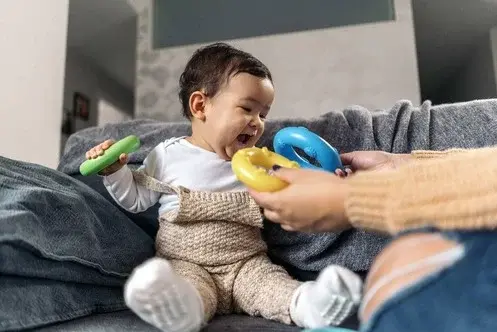Activities & Play
10 Cognitive Activities That Help Boost Infant Development

10 Cognitive Activities That Help Boost Infant Development
Cognitive development begins at birth. Infants learn by exploring, observing, and interacting with their surroundings. Introducing cognitive activities for infants early can improve thinking, memory, and problem-solving skills. These playful yet structured activities also support emotional bonds and communication between parent and child.
Why Cognitive Activities Matter
Every infant develops at their own pace, but stimulation is key to healthy brain growth. Through touch, sight, and sound, babies build important neural connections. Activities tailored to their age group strengthen attention, memory, and social understanding.
From 0 to 3 Months
In this stage, your baby responds to voices, sounds, and familiar faces. They begin to track moving objects and recognize feeding cues.
1. Read Aloud Daily
Reading builds early listening and attention skills. Choose books with bold pictures and soothing rhythms.
2. Talk Constantly
Speak to your baby often. They enjoy hearing your voice and will try to mimic facial expressions or sounds.
3. Use a Crib Mobile
Hang colorful, moving toys above the crib. This encourages eye-tracking and hand movement during tummy time.
4. Sing to Your Baby
Singing introduces rhythm and melody. It helps babies recognize tones, develop listening skills, and bond with you.
Between 3 to 6 Months
Your baby begins to understand cause and effect. They show emotion, reach for toys, and react to your voice or smile.
5. Offer Object Play
Give your baby safe items to grasp, drop, or shake. This teaches control and cause-effect relationships.
6. Introduce Interactive Toys
Use toys with buttons or levers. When they produce sounds or lights, babies learn to expect results from their actions.
7. Try Texture Exploration
Provide soft, rough, and fuzzy toys. Exploring textures enhances tactile perception and curiosity.
8. Water Play
Supervised water play improves sensory and motor skills. Use scoops, floating toys, or colored water for fun interaction.
From 6 to 12 Months
During this period, infants become more mobile and aware. They follow instructions and search for hidden objects.
9. Practice Stacking
Stacking cups or rings help build fine motor skills and problem-solving. Demonstrate and let them imitate your moves.
10. Play Peek-a-Boo
Games like peek-a-boo teach object permanence. Babies learn things exist even when they can’t see them.
Helpful Tips for Parents
- Build a daily routine with varied but familiar tasks.
- Use safe, colorful objects to spark curiosity.
- Read picture books and point at images while naming them.
- Encourage independent play but always supervise.
- Sing songs with hand gestures for motor coordination.
- Go outside and describe what your baby sees or hears.
Final Thoughts
Cognitive development starts the moment a baby is born. Stimulating their senses through consistent cognitive activities for infants helps shape how they think and connect with others. Adjust activities to match your baby’s age, personality, and interests.












